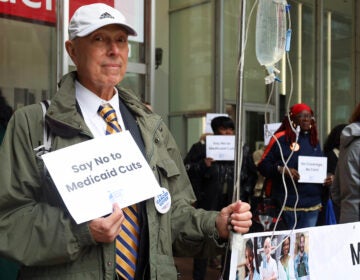Pa. disability advocates and long-term care facilities are bracing for the ripple effects of impending Medicaid cuts
Health policy experts and long-term care operators predict that federal funding cuts will ultimately affect services for “most vulnerable” patients and residents.
Listen 4:42
Left to right, Ru Amagasu, 59, and Aaron Deede, 43, are residents at Inglis House, a nursing home and wheelchair community in Philadelphia that provides long-term care for people with disabilities. (Nicole Leonard/WHYY)
From Philly and the Pa. suburbs to South Jersey and Delaware, what would you like WHYY News to cover? Let us know!
On the outskirts of Philadelphia, near the border of Bala Cynwyd, Pennsylvania sits an impressive castle-like stone building. The site has been home to residents of Inglis House for nearly 100 years.
People in wheelchairs zoomed in and out of the main lobby on a recent Tuesday. Others, also in wheelchairs, participated in demonstrations on pickleball and bowling in a large room with a cavernous ceiling.
Outside in a large courtyard with manicured lawns and a fountain, residents enjoyed the warm weather and clear skies.
“Hey, Jen. How are you, lady?” a nursing administrator called out as she walked down a pathway.
“Good. You?” a woman answered as a nurse pushed her wheelchair by.
Inglis House is a residential nursing facility that provides long-term care for about 180 people with disabilities. Uniquely, it’s a wheelchair community that includes people of all ages and conditions.
It has a physical therapy department, a small grocery store in the basement, a library and recreation rooms.
Aaron Deede, 43, moved in about two years ago. He needs help with some medical issues and activities of daily living after surviving an accident two decades ago, but retaining some independence remains important.
At Inglis, he’s not restricted to a hospital bed and is one of the busiest residents at the facility. He’s in a band, which practices a couple times a week, and is a member of the theater group.
“I’m never in my room,” Deede said. “That’s why I love this. There’s always something to do.”

Most of Deede’s care is covered by Medicaid, just like 93% of all residents at Inglis.
It was a relief for his mother, Ann Phillips, who had been caring for her son at home in Wilmington since his accident. Phillips and her husband struggled to do it on their own as they got older.
“It checked off all the boxes I believe didn’t exist anywhere,” she said of Inglis House. “I was thrilled. I thought it was an answer to my prayers. I can have peace of mind and he can have what he dreamed of.”
But Phillips said she worries about how long this “peace of mind” will last in light of impending federal funding cuts that could have downstream effects on nursing facilities and health care.
“I’m really, really scared, because I cannot replicate what he’s got,” she said. “It is keeping me awake.”
The Trump administration’s 2025 Budget Reconciliation Act, also known as the “One Big Beautiful Bill,” includes major changes and cuts to health insurance programs like Medicare and Medicaid, which cover seniors and people with low incomes, including people with disabilities.
Supporters of the act claim that the changes should not affect vulnerable populations who depend on these programs, but Pennsylvania health policy experts and disability advocates say that’s highly unlikely.
“I think there is a lot of reason to be concerned that vulnerable people in our community are going to suffer as a result of this bill,” said Dr. Rachel Werner, executive director of the Leonard Davis Institute of Health Economics at the University of Pennsylvania.
Predicted funding losses at long-term care facilities
Many people who use wheelchairs, need high levels of daily care and who can’t work to fully support themselves financially because of disabilities will remain eligible for Medicare and Medicaid.
They won’t lose their health insurance, but experts predict that Pennsylvania will receive fewer federal Medicaid dollars overall in the coming years because of cuts to other populations and parts of the program.
As a result, the state may cut payment rates to nursing homes across the commonwealth, which could force some nursing facilities to lay off staff or freeze hiring and wages, cut optional health care services and scale back activities and programs for residents, Werner said.
“Which is all very concerning, because it reduces quality of life for residents,” she added.
A facility may also reduce its census, or the number of beds and people it serves.
“Because they’re going to lack the staff and the ability to care for those residents in a safe manner,” Werner said. “This is going to further reduce the revenue nursing homes have and ultimately could lead to nursing homes closing.”
These are the scenarios that Inglis is fighting to prevent, said Dyann Roth, president and CEO. The organization has been regularly fielding calls and questions from residents and their families concerned about how care could change at the facility.

Leaders and providers are worried, too, Roth said, because the stakes are high.
“We have human beings’ lives at risk,” she said.
The goal is to keep as many services and people as possible, Roth said. In order to do that, she said that Inglis has to prepare as best as possible for funding losses.
“We have to look at contingency plans for the future to mitigate the effects that we know are going to come. We just don’t know when and to what degree,” she said.
Plans involve looking into opportunities to bring in more money from other kinds of insurance programs and revenue streams, without spending more to do so.
It can also include using technology to supplement or support care, and find more efficient ways to provide existing services.
“Because the cost is just going to keep going up,” Roth said. “But I think it’s when we do our most innovative work.”
Increasing awareness in communities
Inglis resident Ru Amagasu, 59, has been carefully following the debate around the new federal law and how funding cuts could potentially affect his home and care someday.
He recently organized a rally outside the facility to raise awareness in the community and keep people focused on the issue.
“People are living their lives and have enough difficulties as it is, so having these other circumstances and people living this other life doesn’t occupy many people’s concerns or thoughts,” he said. “It’s hard to get the word out, but I think it’s important.”
Inglis is a special place, he said, one that has both the health care resources and the social and community pieces that make it an ideal place to live, especially for younger people with disabilities.
Amagasu, who has used a power wheelchair since surviving an accident in 2017, moved into Inglis just before the pandemic.
“Some of these circumstances that happen to people, it’s just kind of out of the blue, so I think it’s really important to have these kinds of facilities able to take care of folks,” he said.

Get daily updates from WHYY News!
WHYY is your source for fact-based, in-depth journalism and information. As a nonprofit organization, we rely on financial support from readers like you. Please give today.







